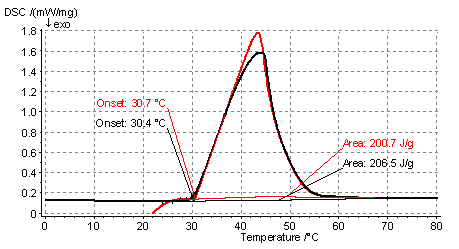
Phone: +7 (383) 330-67-71, Fax: +7 (383) 330-80-56, E-mail: bic@catalysis.ru
5 Lavrentiev Ave., 630090, Novosibirsk, Russia

Phone: +7 (383) 330-67-71, Fax: +7 (383) 330-80-56, E-mail: bic@catalysis.ru
5 Lavrentiev Ave., 630090, Novosibirsk, Russia
Special Methods
Liquid and solid samples in the form of powder, crystals, plates et al.
Differential scanning calorimeter DSC 404 C Pegasus (NETZCH Gerätebau GmbH). Temperature range: –120 ... 700 ºC; RT ... 1500 ?C. Heating rate: 0.1–50 K/min. Atmosphere in work chamber: dynamic, oxidative, reducing, inert, vacuum. Precision: < 2.5% for enthalpy changing, ± 3 K for temperature. Sensitivity: 1–10 mcW. Base line linearity < ± 2.5 mW.
Registration forms for results obtained:

Endothermic melting peak for CaCl2x 6 H2O in alumina pores. The salt content is 35 % wt.
The powder and liquid samples in volume not more than 40 mcL.
The crystalline and plate samples are not more than 6 mm in diameter
A.V. Gubar. Inorganic salts dispersed in porous matrix.